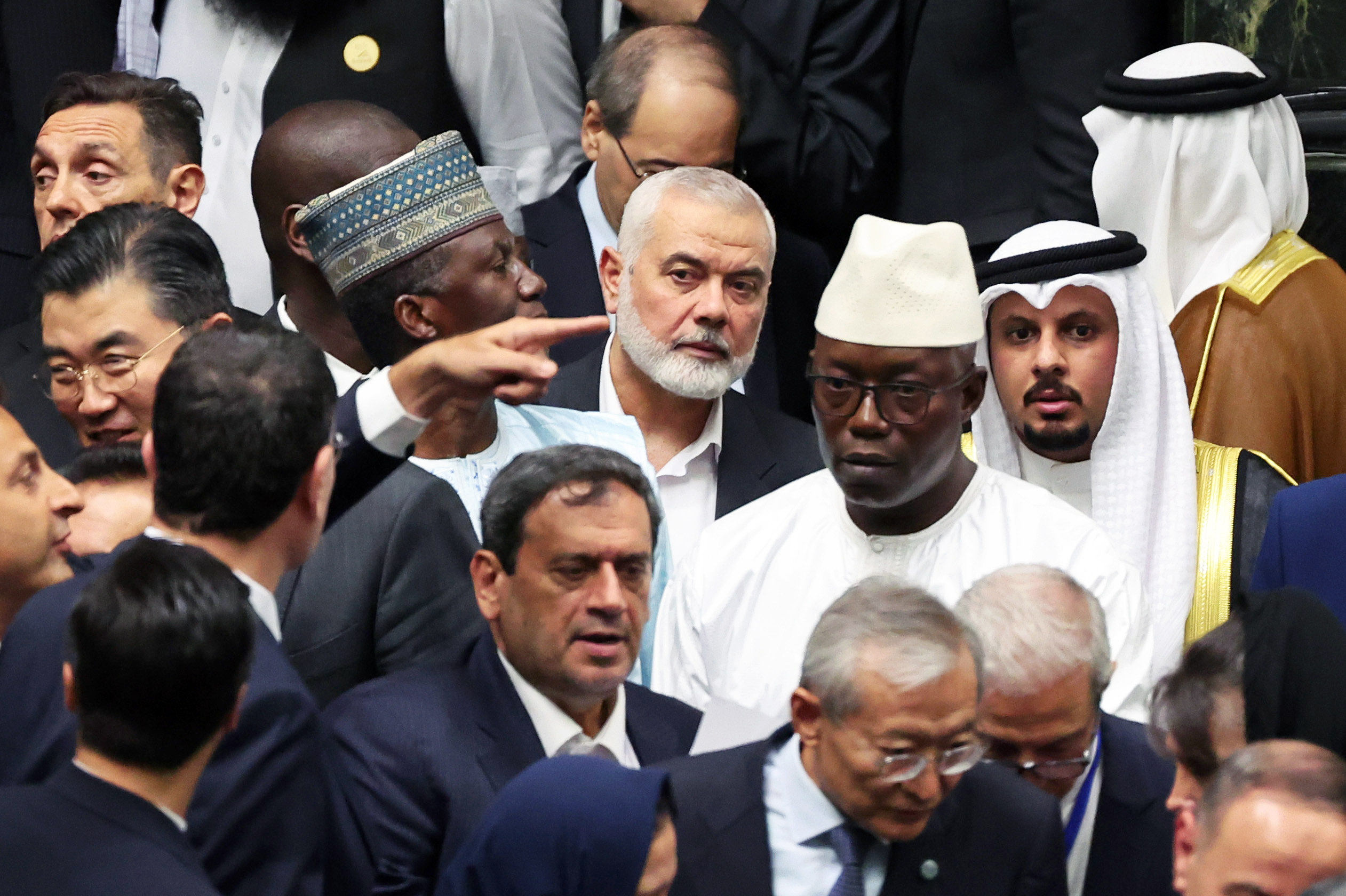That sound you can hear geopolitically is of shoes dropping. At a time of extreme tension in the Middle East, one violent episode can beget another until all-out war becomes inevitable.
Israel’s assassination of a Hezbollah military commander in Beirut and Hamas’s number two in Tehran invites retaliation. The question then turns to what form this retaliation might take, and whether it will risk a wider Middle East conflict. Is the region sliding towards a war that risks involving not simply Israel and its enemies but also the United States and its allies?
The answer lies in whether Iran and its proxies are willing to endure an all-out conflict that would devastate swathes of the Middle East and threaten region-wide stability. Here, the Iranian regime’s calculations about its ability to withstand such a conflict — and indeed retain its own hold on power — will be paramount.
We are not simply talking about an Israeli war with Iran and its proxies in Lebanon, the Gaza Strip and Yemen. The much wider question concerns which other Middle East players might become sucked into a regional conflict with devastating consequences. All-out war between Israel and Iran and its proxies would inevitably spill over into surrounding states and down into the Gulf.
Sometimes overlooked in the war-gaming that goes on at times like this is Iran’s capacity to shut down tanker traffic via the Strait of Hormuz, which handles up to 30 per cent of the world’s oil each day. Such Iranian adventurism would invite a crushing response from the United States, with enormous disruption to the global economy and the security of surrounding oil-rich states.
None of this is preordained, or perhaps even likely, but it would be unwise to discount the risks to region-wide stability if the conflict were to spiral out of control.
In Washington, worst-case scenarios will have been dusted off as a region awaits the aftershocks of two of the most provocative extrajudicial assassinations in a blood-soaked regional history. The killing in a Beirut suburb of Fuad Shukr, a Hezbollah commander, was followed a day later by the remote-controlled bomb that ended the life of Hamas’s Ismael Haniyeh in Tehran. The killings could hardly have been more provocative, nor more damaging to Iran’s proxies and its credibility more broadly.
If Tehran can’t guarantee the safety of someone like Haniyeh on what amounted to a state visit for the swearing of a new president what does this say about its ability to protect its own leaders?
Iran’s spiritual leader Ayatollah Khamenei has vowed revenge. What form this might take is anyone’s guess, but a response there will be.
Leaving aside Haniyeh’s wider importance as a principal negotiator of a ceasefire with Israel in Gaza and the release of those hostages still alive, the bigger question is where all this leaves the desultory American efforts to stop a Middle East escalation. Israel’s twin assassinations have further complicated those efforts at a moment when negotiators were edging towards some sort of accommodation. All bets would seem to be off for the time being.
In all of this, the question arises again of whether Israel’s Benjamin Netanyahu is in any way motivated to bring the Gaza war to a conclusion in some sort of ceasefire arrangement. On the evidence of his government’s slow-walking response to various ceasefire and hostage-release initiatives advanced by American negotiators in partnership with Arab allies, the answer is no.
Since the beginning of the conflict American policy has been captive to Israeli domestic politics and Netanyahu’s own quest to hang on to power in the face of widespread domestic agitation. In remarkable contrast to other moments of crisis, when Israel tends to coalesce around its political leadership, the reverse has been the case during the Gaza war.
Israelis may be invested overwhelmingly in the removal of Hamas as a threat, but a large proportion also regard Netanyahu and his extremist allies as a significant part of the problem. They will not forgive him for the security lapses that contributed to Hamas’s breakout pogrom against Jewish people on 7 October, more than nine months and 40,000 Palestinian casualties ago.
Complicating the situation from the perspective of an international community looking askance at America’s fumbling peace efforts is the state of the White House itself. In the erratic history of American foreign policy there has scarcely been a more inept performance than the Biden administration’s attempts to push its Israeli ally towards a sustainable ceasefire.
From Biden’s initial rush to Israel to embrace Netanyahu to secretary of state Antony Blinken’s so-far futile efforts to stop the war, Washington’s inability to rein in its Middle East ally has been exposed. Last week’s address to a joint session of Congress by Netanyahu, during which he received sixty-one standing ovations, simply underscored American ruptures.
With the United States distracted by one of the most consequential presidential elections in its history, with a senescent lame duck president in the White House and with Donald Trump using the word “Palestinian” as a political weapon, American domestic politics finds itself on a knife-edge.
American political historians like to talk about “October surprises” in the context of presidential elections — those exogeneous events beyond reasonable calculations that threaten to overturn political predictions within weeks of an election. Earlier than might have been anticipated we have entered “August complications” territory, with a Democratic presidential nominee untested in the management of foreign crises and a Republican alternative whose unsteadiness would risk making a bad situation a whole lot worse. This leaves aside Biden’s own limitations.
In Tehran and Beirut these permutations will be weighing on calculations about what do next. At this stage, Ayatollah Khamenei and the Hezbollah religious leader Hassan Nasrallah seem unlikely to risk all-out conflict across Lebanon’s frontier, let alone further afield. Neither leader has a reputation for capriciousness.
Since the Gaza war began, Tehran has seemed intent on avoiding a wider regional conflict. Hezbollah has held back from unleashing the sort of rocket barrage against Israeli cities and towns of which it is capable.
Israel’s likely response to an escalation would be devastating on a scale unmatched by its various incursions into Lebanon, including its invasion of 1982 and its war of 2006. Neither ended well for Israel, and the 1982 invasion spawned Hezbollah.
As the world watches and waits for the next act of violence that will weigh further against prospects of an end to the Gaza war, other shoes will undoubtedly drop. Netanyahu seems determined to stretch limits, both militarily and politically, as he has from the beginning. Washington’s influence remains much diminished. •




